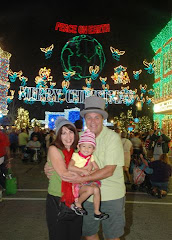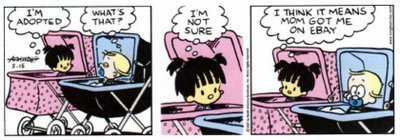 Our treasured friends, Dan & Pat Lee, sent us the following item. We worked with the Lees on the worship team at a church we attended for many years and have shared quite a few good times with them. Several of their relatives live in the San Francisco area - they look VERY Chinese but they're American as apple pie. They have been wonderful supporters of our adoption of Joanna .... in fact, it was at their suggestion that we started this blog ........
Our treasured friends, Dan & Pat Lee, sent us the following item. We worked with the Lees on the worship team at a church we attended for many years and have shared quite a few good times with them. Several of their relatives live in the San Francisco area - they look VERY Chinese but they're American as apple pie. They have been wonderful supporters of our adoption of Joanna .... in fact, it was at their suggestion that we started this blog ........This homey bit of Cantonese language heritage was sent to us by Phil M. in L.A. and we happily pass it on to you. I had a craving for a sweet taste of childhood the other day; so I went shopping for a can of grass jelly. I was putting said treat into my cart and looking for my Ranch 99 VIP card when a woman with three kids in tow ran into my cart.At that moment, both of us said, "Ai-ya." The children giggled, she apologized, and I quickly replied, "M'sai. No apology needed." Although it was a minor exchange, I later realized that Ai-ya is more than just two characters; it is part of the spirit of being Chinese ... in a moment of surprise I could've said just about anything - my reaction was to say Ai-ya. I was surprised that I would instinctively use my mother's tongue because I've always known that I don't speak Cantonese well. No matter how far removed I've become as an American, there is something at my core that is Chinese.I decided to conduct informal research about Ai-ya. First, I went to a national bookstore chain to review its Chinese language materials. I thumbed through all the Chinese language materials, but couldn't find any vocabulary drill including Ai-ya. Seeing that the publishers of tourist books were not going to be helpful, I decided to observe its use in the community. I clipped my cell phone to my belt, grabbed a couple of bakery pink boxes and sat around San Francisco's Portsmouth Square drinking 7-Up and eating dim sum. Lo and behold, I heard Ai-ya used in a variety of ways.
Based on my personal experience and this observation, I've developed a personal understanding of Ai-ya. Aiya is 24-carat Chinese gold. Ai-ya is more than just two characters; it is part of the spirit of being Chinese and may even go back to antiquity. It is used wherever the Chinese have been in the diaspora of the last sesquicentennial.How you say Ai-ya can say volumes about your state of mind. For example, when the problem is minor, I can say "Ai-ya" in a short/curt manner. However when I am extremely stressed, I can draw it out to nearly five seconds. (I'm planning an experiment where I get a room full of people to meditate using it as a mantra.. With practice, I might get them to draw out Ai-ya even longer.)As you read the following ways Aiya can be used, the mental image to solicit is to picture any of t he mothers from Amy Tan's *The Joy Luck Club.* For those who have met anyone in my family, you can picture one of my relatives instead:Surprise: "Ai-ya! A surprise party for me?"
Joy: "Ai-ya! You got 5 out of 6 in Lotto!"
Distaste: "You expect me to drink that herbal medicine concoction of yours? Aiya!"
Doubt: "Do I have to wear that lemon yellow/lime green sweater my mother made? I wonder if she would notice if I accidentally donated it to Goodwill? Ai-ya."
Awe: "Your son got accepted into Harvard Law School!?! Ai-ya!"
Irritation: "Clean your room. Ai-ya! Why you live like a pig?" [Here I have to insert a version of Dan Lee's, when extremely and suddenly irritated: the multiple Ai-ya, "Ai-ya, ai-ya, ai-ya, ai-ya, ai-ya!" which needs to be said fast enough that it sounds like one word. I also, in his defense, have to say that he hasn't used this particular expression in quite a while.]
Large astonishment: "Ai-ya! She switch majors from Business to Art History!"
Disapproval: "Report Card-5 A, 1 B? Always a B in Math. Ai-ya." (Actual quote from my mother when I was a sophomore in high school.)
Shock: "What? Ketchup on Yang Chow Fried Rice ... Ai-ya!"
Outrage: "Never clean your rice cooker with that steel scouring pad! Ai-ya!"
Verge of internal combustion: "I can't deal with the family asking when and if I'm getting married! Ai-yaaa!"
Ai-ya is an all-purpose phrase that comes from deep in the soul. Ai-ya is both simple and complex: on one hand it is a couple of Chinese characters, on the other hand it can be a whole speech describing the state you are in. Ai-ya says, "I'm afraid", "I'm in pain", "I don't believe it." It is an exclamation of exuberance, a shout of hurt, a cry of fear, and the reflex of being startled, and the embrace of joy.It is unfortunate that English has no equivalent to Ai-ya. It saddens me that American English doesn't afford me a fun phrase to emote. "Shucks", "Darn" and the plethora of swear words cannot convey what Ai-ya can. So, I'm going to propose that we start an initiative for American English should grab on Ai-ya or the Yiddish "Oy" for our use.
So the next time you go to a teahouse for dim sum or decide to go shopping at an Asian market, listen to the lively banter as friends and families meet. It's a wonderfully vibrant, alive community out there. Who knows, you just might get caught up the lyrical rhythm of the people.Ai-ya, what fun!
Based on my personal experience and this observation, I've developed a personal understanding of Ai-ya. Aiya is 24-carat Chinese gold. Ai-ya is more than just two characters; it is part of the spirit of being Chinese and may even go back to antiquity. It is used wherever the Chinese have been in the diaspora of the last sesquicentennial.How you say Ai-ya can say volumes about your state of mind. For example, when the problem is minor, I can say "Ai-ya" in a short/curt manner. However when I am extremely stressed, I can draw it out to nearly five seconds. (I'm planning an experiment where I get a room full of people to meditate using it as a mantra.. With practice, I might get them to draw out Ai-ya even longer.)As you read the following ways Aiya can be used, the mental image to solicit is to picture any of t he mothers from Amy Tan's *The Joy Luck Club.* For those who have met anyone in my family, you can picture one of my relatives instead:Surprise: "Ai-ya! A surprise party for me?"
Joy: "Ai-ya! You got 5 out of 6 in Lotto!"
Distaste: "You expect me to drink that herbal medicine concoction of yours? Aiya!"
Doubt: "Do I have to wear that lemon yellow/lime green sweater my mother made? I wonder if she would notice if I accidentally donated it to Goodwill? Ai-ya."
Awe: "Your son got accepted into Harvard Law School!?! Ai-ya!"
Irritation: "Clean your room. Ai-ya! Why you live like a pig?" [Here I have to insert a version of Dan Lee's, when extremely and suddenly irritated: the multiple Ai-ya, "Ai-ya, ai-ya, ai-ya, ai-ya, ai-ya!" which needs to be said fast enough that it sounds like one word. I also, in his defense, have to say that he hasn't used this particular expression in quite a while.]
Large astonishment: "Ai-ya! She switch majors from Business to Art History!"
Disapproval: "Report Card-5 A, 1 B? Always a B in Math. Ai-ya." (Actual quote from my mother when I was a sophomore in high school.)
Shock: "What? Ketchup on Yang Chow Fried Rice ... Ai-ya!"
Outrage: "Never clean your rice cooker with that steel scouring pad! Ai-ya!"
Verge of internal combustion: "I can't deal with the family asking when and if I'm getting married! Ai-yaaa!"
Ai-ya is an all-purpose phrase that comes from deep in the soul. Ai-ya is both simple and complex: on one hand it is a couple of Chinese characters, on the other hand it can be a whole speech describing the state you are in. Ai-ya says, "I'm afraid", "I'm in pain", "I don't believe it." It is an exclamation of exuberance, a shout of hurt, a cry of fear, and the reflex of being startled, and the embrace of joy.It is unfortunate that English has no equivalent to Ai-ya. It saddens me that American English doesn't afford me a fun phrase to emote. "Shucks", "Darn" and the plethora of swear words cannot convey what Ai-ya can. So, I'm going to propose that we start an initiative for American English should grab on Ai-ya or the Yiddish "Oy" for our use.
So the next time you go to a teahouse for dim sum or decide to go shopping at an Asian market, listen to the lively banter as friends and families meet. It's a wonderfully vibrant, alive community out there. Who knows, you just might get caught up the lyrical rhythm of the people.Ai-ya, what fun!


















3 comments:
Hi, Don and Be! I feel like I've just been "published!" Ai-ya! And thank you for the lovely comments about us. We love you, too ;-)!
Love, Pat
If you've ever had Yangzhou fried rice in Yangzhou, as I have, you would say Ai-ya!!!! too if anyone dared to put ketchup on it.
Yucko!
Yangzhou fried rice is possibly the best dish/rice you have ever eaten.
A local restaurant here has Yang chow fried rice and it is passable, but definitely not the same.
Karin
www.savvythinker.com
I heard the phrase "Ai ya" on TV and Googled it; that's how I ended up at your blog. Nice explanation!
I wonder if the German "Ach" is at all similar. The last German speakers in my family were three generations ago, yet "Ach" is something I learned from my mother.
I'll have to look it up and learn more. Thanks for the inspiration!
Post a Comment